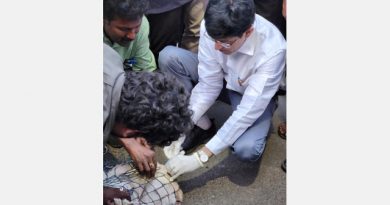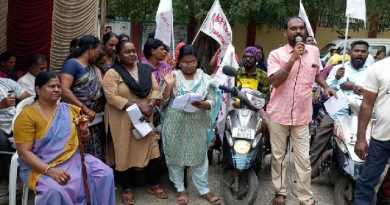NEELUM SARAN GOUR AND MANORANJAN BYAPARI WON THE HINDU PRIZE ‘18 FOR FICTION AND NON-FICTION ON DAY TWO OF THE LIT FOR LIFE’19
~ Kanimozhi Karunanidhi, noble laureate Venki Ramakrishnan, Rajmohan Gandhi, James Crabtree, and Audrey Truschke were some of the key speakers on day two of the literature festival ~
January 13th, 2019: Hindu Lit for Life 2019, the sharpest literary festival in the country, kick-started day two of the festival today, at the Sir Mutha Venkatasubba Rao concert hall. Ms. Neelum Saran Gour bagged the Hindu Prize 2018 for fiction. N. Ravi, Director, The Hindu Group, handed over the award to Ms. Neelum. Mr. Manoranjan Byapari won the Hindu Prize in the non-fiction category. This is the first time since the inception of the Lit for life festival that there has been a Hindu Prize for the non-fiction category and Mr. Rajmohan Gandhi handed Mr. Byapari the award. Both the authors received a cash prize of Rs. 5,00,000 each and a trophy for winning the Hindu Prize 2018.
Ms. Neelum won the coveted Hindu prize for her book ‘Requiem in Raga Janki’. Based on the real-life story of Hindustani singer Janki Bai Ilahabadi (1880-1934), ‘Requiem in Raga Janki’ is the beautifully rendered tale of one of India’s unknown gems. ‘Requiem in Raga Janki’ brings to life a golden era of music through the eyes of a gifted performer.
Mr. Byapari won the Hindu prize in the non-fiction category for his book ‘Interrogating My Chandal Life: An Autobiography of a Dalit’. The Book talks about Mr. Byapari’s traumatic life as a child in the refugee camps of West Bengal and Dandakaranya. The book charts his futile flight from home to escape hunger, in search of work as a teenager around the country, only to face further exploitation. The book goes on to explain how he landed up in prison and how he overcame obstacles to become an author.
Mr. Daniel Handler, the Author, handed over The Young World-Goodbooks awards 2018. Vinayak Varma won the best picture book story award for his book ‘Angry Akku’, Rajiv Eipe won the best storybook illustration award for ‘Ammachi’s Amazing Machine’, the award for the best fiction book went to Venita Coelho for ‘Boy No. 32’ and the best non-fiction award went to Mamta Nainy for ‘A Brush with India Art’.
Day two of the Lit for Life 2019 also provided the city’s literary enthusiasts with many interesting session. In the first session of the day Dr N Ezhilan and N Ram were in conversation with Kanimozhi Karunanidhi for the session on ‘Dravidian Ideology in Praxis: Homage to Kalaignar Karunanidhi’. While discussing about ideologies related to Dravidian politics, Kanimozhi mentioned that Dravidian Politics is all about social justice, self-respect, caste system and its barriers which today people refer to as Human Rights. Kanimozhi also said that Dravidian politics has always believed in inclusive progress. The panellists then discussed the contributions made by Kalaignar Karunanidhi in terms of health facilities, insurance schemes for the aid of common people. When asked how Kalaignar Karunanidhi was as a father, Kanimozhi said that he was always there for her. “Kalaignar Karunanidhi valued personal relationships; forgave people easily as he understood that people are full of flaws. He was an emotional person which reflected in his political ways as well.” Added Ms. Kanimozhi.
The session on ‘What Ails Indian Science and What Can Be Done about It?’ was an informative discussion between Nobel prize winner Venki Ramakrishnan and Dr K Vijay Raghavan. During the session Mr. Ramakrishnan highlighted that, the investment in science and research in India has been declining. He goes on to explain that while other countries are increasing their investment in R&D India too must follow. Mr. Ramakrishnan also suggested that Indian corporates could possibly play a big role in aiding this by increasing their investment in science and technology.
Talking about why Rajmohan Gandhi wrote, ‘Modern South India’, during a session with Nirmala Lakshman, Mr. Gandhi mentioned that North India needs to be educated about South India and the need is long overdue. Mr. Gandhi also mentioned that he owes a great debt to all the historians and the people he got the chance to interview in the four southern principal states. He talked how his aim was not to identify heroes or villains but to try to recapture the reality the best he could.
In the session ‘Writing a Memoir’, Chike Frankie Edozien discusses his book ‘Lives of great men’ with Ramya Kannan. In his book, Chike explains his personal experience of being a journalist and a gay Nigerian man. Chike also encouraged everyone to write a diary listing things happening every time, all the time. “Writing a diary leads to increasing knowledge” said Chike during the session.
Other important sessions on day two were ‘The Battleground of Indian History’ – Audrey Truschke, Ira Mukhoty, John Keay and Rajmohan Gandhi in conversation with Aditya Mukherjee, ‘The Silent Epidemic: The Explosive Growth of Mental Health Problems in India’ – Dr Samir Parikh and Gayathri Prabhu in conversation with Dr Ennapadam S Krishnamoorthy, ‘Crazy Rich Indians’ – James Crabtree in conversation with Suresh Seshadri and ‘Why We Should All Be Feminists’ – Sumana Roy, Sharanya Manivannan, Manjula Padmanabhan and Madhavi Menon in conversation with Vaishna Roy.
For more information, follow LFL on social media Facebook Twitter and Instagram
To register to visit http://www.thehindulfl.com




